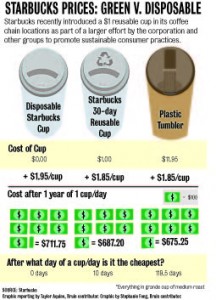
The plastic cups are another alternative the global coffee enterprise is offering its customers, along with the other reusable cups the chain sells, that are intended to reduce the amount of waste generated by paper cups.
Customers at coffee shops on campus also receive a discount if they use alternative drinking containers, a policy shared with Starbucks, The Coffee Bean & Tea Leaf and Peet’s Coffee & Tea.
Raquel Starkey, an employee at the Bruin Buzz Coffee Bar and fourth-year neuroscience student, said she serves customers who bring in both UCLA-themed reusable drinking cups as well as non-affiliated cups. Customers who bring in ceramic cups can get coffee refills for 99 cents and those who bring in tumblers can get coffee refills for $1.30.
Both Starbucks and Peet’s Coffee & Tea offer a 10 cent discount on drinks, and The Coffee Bean & Tea Leaf cuts 10 percent off of the total beverage price.
Starbucks’ effort to reduce the volume of paper cup waste -– approximately 4 billion cups globally each year —-– is largely in response to negative criticism from consumers over the volume of waste generated by the company, according to reports by CNN.
“(Starbucks is) really trying to get away from paper cups totally and just have reusable cups where you buy the cup and then you just bring it back (next time),” said Aaron Wilson, an employee at the Starbucks on Broxton and Weyburn avenues.
Starbucks’ new reusable cup is in line with efforts many other organizations have undertaken in recent years to reduce waste.
Stefan Karlsson, a fourth-year English student, said he uses a plastic tumbler that a friend of his from the student group Ecology, Economy, Equity gave him.
“I thought it was a really neat way to spread awareness about the different fair trade issues,” he said.
Karlsson said he supports Starbucks’ green initiatives and would purchase a reusable cup should his plastic tumbler break or go missing.
“It is just one dollar more and you are helping out in a tiny way,” Karlsson said.
Nurit Katz, chief sustainability officer at UCLA, is leading efforts to reuse, recycle and compost waste produced by UCLA.
The University of California system, including UCLA, has a target goal of zero waste by 2020, which centers on sending zero waste from the campus to landfills, Katz said.
“Everyone makes this choice to bring a reusable water bottle or reusable mug and it seems like a small choice, but it really adds up,” Katz said. “It makes a big difference when you make these small choices.”
Fourth-year comparative literature student Andrea Acebes, however, said she would not purchase Starbucks’ new reusable cup because she doesn’t think the discount is worth it for her.
“I usually don’t buy enough coffee to make it worth it and most of the time, I just get coffee at home,” Acebes said.
Acebes said she formerly worked at Tully’s Coffee Shop in Newport Beach and observed that very few customers used tumblers or other reusable cups. The coffee shop offered a small discount for customers who brought in reusable cups.
“We hardly ever got people that brought in their own cups,” Acebes said. “A lot of people just run to get their coffee and they don’t take their own cups.”
Wilson said, however, that the Starbucks seems to have been successful in selling the new cups – they are currently out of stock.
“We sold out in two days of our reusable cups so we don’t have any more right now,” Wilson said. “We’re waiting for them to send us more. People are really into it and they like (it).”
Email Aquino at taquino@media.ucla.edu.
It is also a good chance to reduce waste.
Another technique is available, degrading the paper cup. This idea does not
affect customer and also the star buck owner.